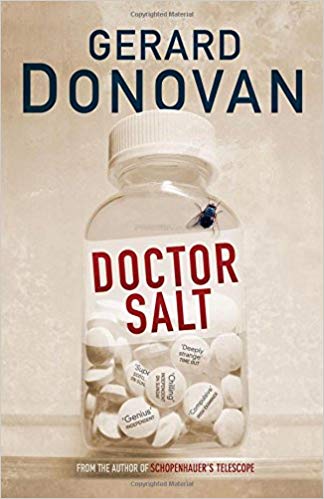Listener – June 11, 2005

A couple of weeks before I read Gerard Donovan’s second novel, Doctor Salt, and Craig Clevenger’s brilliant debut novel, The Contortionist’s Handbook, a writer friend, who has an encyclopedic knowledge of pharmacology, told me that the guy who concocted the drug Ecstasy originally called it Empathy. He also posited that counselling for emotional disorders is a thing of the past: “Why dig up a shitty childhood, when you can bury it with blocking drugs?” I answered him with an uneasy smile. If I knew then what I know now, I would have said: “Read Doctor Salt.”
Irish poet Gerard Donovan’s first novel, Schopenhauer’s Telescope, a grim tale of civil war in a non-specific location in Europe, was longlisted for the 2003 Man Booker Prize. Doctor Salt, set in Salt Lake City, is an assault on the pharmacological industry, and for the first 80-odd pages of the novel Donovan asks a lot. (Reading it, I felt as though I was bummed out on antidepressants). It goes vaguely like this: Sunless, a paranoid simpleton, lives alone, and regularly visits his doctor, Mr Fargoon, who fronts a drug company called Pharmalak. The company advertise its drugs on strategically placed video screens. Its pills, the company claim, will cure disorders such as Acute Envy Dysfunction and Expanded Depersonalization Syndrome.
Sunless has been recruited to take part in the company’s drug trials, and we’re lead to believe he suffers from paranoid schizoprenia, which he tells Fargoon, “is when you make two of yourself in case they get you.” “They” are the government and its agents are flies, but Sunless is convinced they are really angels (Beelzebub’s mob). He is also haunted by a notion that Fargoon has kidnapped his father. Eventually, a Pharmalak lackey produces an urn of ashes – the remains of his dead dad. Suffice to say, Sunless exists, without a past or a future, in an infuriating purgatory.
He then (thank God!) morphs into Salt, and we get a conventional first-person narrative. We learn how Salt also became Sunless. He (Salt) and his mother started popping prescribed pills after her new-born son (Sunless) died; his father struggles, and fails, to keep up medical insurance payments after he is felled by a terminal illness. The novel ends in a graveyard where a surreally-lucid Salt holds an inquest of sorts into his parents’ deaths – which serves as the catalyst for an outpouring of his grief.
Doctor Salt tells some hard truths about United States’ sickness industry, but I am surprised Donovan, a highly-talented novelist, didn’t find a simpler way to set up his nightmarish yarn.

Craig Clevenger’s The Contortionist’s Handbook is easier to swallow. In an interview the Texan summarised his kick-start novel thus: “First,” he said, “I’d call it the autobiography of a child prodigy forger as told via a psychiatric interview following a pain-killer overdose. Second, I summarise it as the end result of a medical textbook editor hooked on amphetamines writing a bodice-ripper romance.”
Clevenger took a punt and gave up his day job and lived off credit cards to write his racy page-turner. Good move. Not only is his novel a commercial success (the film rights have been picked up by the outfit who made Donnie Darko), it has also been lauded by high-flying writers Chuck Palahnuik, who reckons it’s the best book he’s read in a decade, and Irvine Welsh, who enthused: “The Contortionist’s Handbook is so accomplished . . . that it instantly elevates Craig Clevenger into the top echelon of writers.” Is it that good? Depends on whether you enjoy the work of the aforementioned writers, and the likes of Ken Kesey and Elmore Leonard. A bloke’s book? Maybe.
John Dolan Vincent was born with an extra digit on one hand and on the wrong side of the tracks. He’s tagged as a slow learner and, although it’s not spelt out, has a condition akin to Asperger’s Syndrome. Vincent has a photographic memory and a flair for mathematics. He teaches himself the art of forgery, and his talents are in demand by the criminal fraternity. But Vincent has to cope with “godsplitting” headaches, which are so debilitating that his self medicating leads to overdoses and emergency wards. To outwit the law and psychiatric evaluators he creates new identities, and studies the legal and medical systems. We are also taken on a romp through seedy 1980s Los Angeles. The plot and Clevenger’s prose style gripped me from beginning to end. Handbook is spiced with literary knowingness, suspense, drugs, sex and the occasional tender moment:
“Sometimes I couldn’t sleep, because I wanted to tell her everything, but instead I’d hold her so tightly I thought I would hurt her. She never said anything, just moaned, quiet. I’d measure her breathing, count how many times she’d stroke my knuckles before she stopped, and then I knew she was asleep. I’d draw her profile in the dark, over and over, happy except for knowing that everything she knew about my life was fiction.”